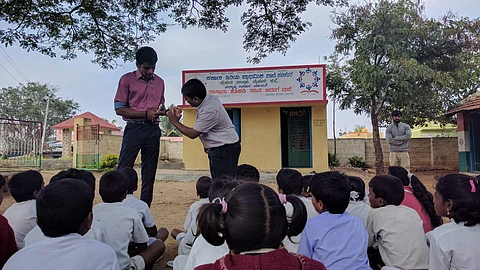

G Ramasubramaniam was in school when an incident changed the course of his life. During a coding competition, he unknowingly managed to help a friend. "We were all coding every day and a friend of mine would call every time he got a code right or wrong, telling me what he was doing. I would patiently listen and pass words of encouragement," says Ram. A couple of years later, this friend, while introducing Ram to his mother, told her that Ram is behind his success. "That statement was shocking because I didn't realise that I had done anything," he adds.
Shortly after, Ram went to a government school where his mother was a teacher. There too he just sat and listened to the students. However, while he was leaving, many of the students asked for his autograph. "Again, this shocked me because I had just listened to them," says Ram. At that point, Ram understood why it was happening. "The youth need a non-judgmental ear that will listen to them and a gentle pat on their backs. Unfortunately, this is lacking in our societal structure," says Ram. This prompted him to start Talent Quest for India, a platform to help the youth.
English and beyond
While he would go on to study Instrumentation and Control Engineering at SRM Institute of Science and Technology, Chennai, he never stopped lending an ear to the youth at his college and beyond. "I learnt that one of the major problems that the youth — especially those migrating from small towns to big cities — face is their lack of spoken English skills and the fear to speak the language," says Ram. Soon, he and two of his friends, Madhusudhan Balasubramaniam and Kandavel SS, launched Express, a programme that will help students learn English through a gamified model. They started it by helping their juniors in college and also approaching the government schools nearby.
Express is just one of the first programmes that Talent Quest for India has launched. "The students whom we managed to train expressed their interest to help more students in their own districts. A lot of them connected to government school students in their districts and that's how the programme expanded," says Ram. Over the next few years, these college students helped the school students and developed a culture of student-to-student mentoring.
Talent Quest for India also partnered with various CSR initiatives and other NGOs for other programmes. "With Ullas Trust, we managed to help a lot of students in Tier II and Tier III cities with personality development skills. The programme is mostly focused on students of Classes IX to XII," explains Ram, adding, "By partnering with the CSR initiative of KPIT Technologies in Bengaluru, we managed to launch the Chhote Scientists programme for students of Classes VI to VIII. The Science-based programme helps students innovate and invent."
Graduating roles
What's wonderful about the programmes at Talent Quest for India is that students' roles change as they graduate. "The students who were being trained during school go on to become volunteer mentors themselves when they move to college," says Ram. But that's not all. "When these college students land jobs in the corporate sector, they further help mentoring their juniors in communication skills and other soft skills," explains Ram.
And these roles didn't change even during the pandemic. "Since April 2020, we have initiated mentoring over phone calls. Each college student is responsible for one school student and for half an hour every day, they call the student and teach some new English words, stories and also do some activity. This ensures that government school students are still associated with learning, even when internet inequality continues to be a problem," says Ram. A similar programme was also initiated for college students who were being mentored over phone calls by ex-volunteers who are now in the corporate sector.
